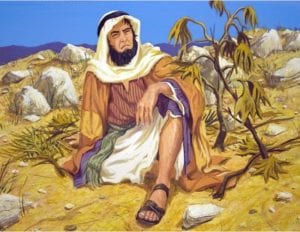
Synopsis of the Book of Jonah
The story of Jonah has great theological significance. It is about a disobedient prophet who rejected his divine commission, was cast overboard in a storm and swallowed by a great fish, rescued in a marvelous manner, and returned to his starting point. He then obeyed God and went to Nineveh. The Ninevites listened to his message of doom and repented immediately. From the king to lowliest subject, the Ninevites humbled themselves in sackcloth and ashes. Because the whole city repented, God did not carry out His punishment. Jonah was angry because God spared the Ninevites. Jonah then left the city for a place to the east of it, where he built himself a hut. The LORD provided a gourd plant which grew up over Jonah’s head, giving shade and comfort. But the next morning, a worm attacked the plant and it withered. When the sun arose, God provided a scorching east wind; and the sun beat upon Jonah’s head till he became faint. Jonah wished for death, but God turned it into a teaching moment.
Why did Jonah refuse to go to Nineveh in the first place?
The reason why Jonah refused to go to Nineveh was not because he was afraid or thought that the task was hopeless. The reason why Jonah did not want to go to Nineveh was given by Jonah himself: “This is why I fled toward Tarshish. I knew that you are a gracious and merciful God, slow to anger, abounding in kindness, repenting of punishment.” (Jonah 4:2). Jonah knew that if he went to Nineveh, the Ninevites would repent and that God would spare the city from punishment. The Ninevites were enemies of Israel and Jonah did not want to have anything to do with saving the city. As long as Nineveh existed, it would be a threat to Israel. That also explains why Jonah was angry when God spared the Ninevites.
Why would God be concerned for the welfare of the Ninevites if they are enemies of His chosen people?
Nineveh was the capital of the Assyrian empire which destroyed the Northern Kingdom of Israel around 722 B.C. Some people say that God is concerned with all peoples and calls everyone to repentance. That sounds well and good, but from another point of view, the story of Jonah showcases God’s divine will. If we are to go through the prophetic books in the bible, the fall of the Kingdom of Israel was due to the people’s disobedience to God and refusal to heed the call of the prophets to repentance, the refusal to turn away from idol-worship, injustice and all other manners of evil. Somehow, the Ninevites had a role in the divine will, just as the Babylonians had a role in the destruction of the Southern Kingdom of Judah around 587 BC.
Many people remember the story as “Jonah and the whale.” But I think it is better to remember the story as “Jonah and the Gourd Plant.” Jonah was mad at God for sparing Nineveh, so God used the gourd plant to teach Jonah a lesson. Jonah mourned the loss of the gourd plant but showed no concern for the thousands of people in Nineveh. God said to Jonah: “Do you have a right to be angry over the gourd plant?” Jonah answered, “I have a right to be angry—angry enough to die.” Then the LORD said, “You are concerned over the gourd plant which cost you no effort and which you did not grow; it came up in one night and in one night it perished. And should I not be concerned over the great city of Nineveh, in which there are more than a hundred and twenty thousand persons who cannot know their right hand from their left, not to mention all the animals?” (Jonah 4:9-11) Jonah the prophet was sent to call the thousands of Ninevites to repentance, but in the end, the prophet himself needed to be taught a lesson on love and mercy. Jonah’s priorities were messed up. Are we sometimes in the same way more concerned about the small things that we have, rather than the welfare of thousands of people – especially those who we consider as our enemies?